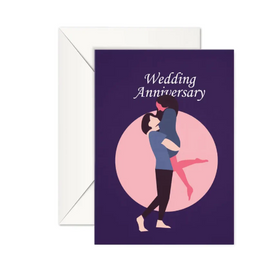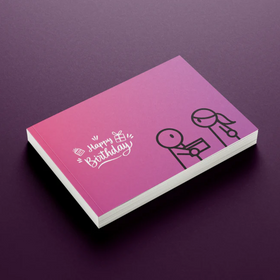on all orders

The Ultimate Guide to Choosing the Perfect Gift for Any Occasion
Gift-giving is a universal language of love, appreciation, and sometimes, even reconciliation. Yet, the journey to finding the perfect gift can often feel like navigating a labyrinth filled with pitfalls and uncertainties. What if the gift you choose doesn't resonate with the recipient? What if it sends the wrong message? These concerns can transform the joyous act of gift-giving into a stressful ordeal. That's why we've crafted this ultimate guide—to arm you with the insights, tips, and strategies you need to consistently choose the perfect gift for any occasion. From understanding the emotional and psychological impact of your choices to exploring unique and thoughtful gift options, this guide is your comprehensive roadmap to becoming a master gift-giver.
Why Choosing the Right Gift Matters
The act of giving and receiving gifts is deeply ingrained in human culture and has significant emotional and psychological implications. While it may seem like a simple exchange of items, the reality is far more complex. Choosing the right gift can serve as a powerful expression of your feelings, strengthening your bond with the recipient and creating a lasting impression. Conversely, a poorly chosen gift can send the wrong message, leading to disappointment or even strain in the relationship.
Emotional Impact
A well-chosen gift can evoke a range of positive emotions in the recipient, from joy and gratitude to a sense of being understood and valued. For example, imagine giving your partner a piece of jewelry that holds sentimental value, like a locket with a picture of a cherished moment. The emotional impact of such a gift can be profound, deepening your connection and adding a new layer of intimacy to your relationship.
Psychological Benefits
Psychological studies, such as those published in the Journal of Consumer Psychology, have shown that the act of giving can release endorphins, creating a sense of well-being and happiness for both the giver and the recipient. Moreover, giving a thoughtful gift can also improve your own mental health by fostering a sense of generosity and altruism.
Social Dynamics
Gift-giving also plays a crucial role in social dynamics. In a professional setting, for example, giving a well-thought-out gift to a colleague or boss can help solidify your working relationship and may even open doors for future opportunities. However, a poorly chosen gift, such as an overly personal item, can create awkwardness and may be considered unprofessional.
The Risk of Getting It Wrong
While the benefits of giving the right gift are numerous, the consequences of making a poor choice can be severe. For instance, giving a fitness tracker to someone who is sensitive about their weight could be interpreted as insensitive or offensive, potentially damaging the relationship.
The Bottom Line
The stakes are high when it comes to selecting the right gift, making it more than just a transactional exchange. It's an opportunity to strengthen relationships, evoke positive emotions, and even improve your own well-being. Therefore, taking the time to choose the right gift is not just a nice thing to do; it's essential.
Factors to Consider When Choosing a Gift
Selecting the perfect gift is more than just a quick trip to the store or a few clicks online; it's a thoughtful process that requires careful consideration of various factors. These factors go beyond the superficial aspects of gift-giving and delve into the nuances that can make or break the experience for both the giver and the recipient. In this section, we'll explore the key elements you should consider when choosing a gift, from setting a realistic budget to understanding the recipient's personal preferences. By taking these factors into account, you'll be better equipped to choose a gift that resonates, creating a memorable experience for all involved.
Budget
While the saying goes that "it's the thought that counts," your budget is a practical consideration that can't be ignored. You don't have to break the bank to show someone you care. Sometimes, even a small, thoughtful item can make a big impact. Set a realistic budget and stick to it.
Relationship with the Recipient
Your relationship with the recipient should be a significant factor in your gift choice. For a spouse or close family member, a more personal, sentimental gift might be appropriate. For a coworker or an acquaintance, a less personal but still thoughtful gift could be a better fit.
Occasion
The occasion for which you're buying the gift will also guide your choice. A romantic gift like jewelry might be perfect for an anniversary but would be inappropriate for a corporate event. Always consider the context.
Personal Preferences of the Recipient
The best gifts show that you've put thought into the recipient's likes and dislikes. If you know they're an avid reader, a bestselling book in their favorite genre could be a hit. If they're into fitness, consider high-quality gym gear or a smartwatch.
Popular Gift Ideas for Different Occasions
Choosing the right gift often depends on the occasion you're celebrating. Different events call for different types of gifts, each with its own set of unwritten rules and expectations. In this section, we'll explore popular gift ideas tailored for specific occasions, from birthdays and anniversaries to various holidays, to help you make an informed decision.
Birthdays
- Tech Gadgets: Items like smartphones, smartwatches, or headphones are usually well-received.
- Books: A bestselling novel or a classic piece of literature can be a thoughtful gift.
- Spa Vouchers: Give the gift of relaxation with a day at the spa.
Anniversaries
- Jewelry: A piece of jewelry like a necklace or a bracelet can be a lasting reminder of a special day.
- Romantic Getaways: A weekend trip to a romantic destination can provide lasting memories.
- Personalized Keepsakes: Items like photo frames or custom artwork can hold sentimental value.
Holidays
- Christmas: Consider holiday-themed items like ornaments or festive food baskets.
- Valentine's Day: Flowers, chocolates, and romantic dinners are classic gifts.
- Easter: Themed baskets filled with treats and small gifts are popular.
Unique and Thoughtful Gift Options
In a world flooded with generic gift options, standing out can be a challenge. But fear not, for unique and thoughtful gifts are the perfect way to elevate your gift-giving game. These gifts go beyond the ordinary, offering a personalized touch or a memorable experience that the recipient will cherish for years to come. In this section, we'll explore some of the most unique gift ideas that are sure to leave a lasting impression.
Personalized Gifts
Personalized gifts offer a level of customization that makes the recipient feel truly special. Whether it's a custom-made piece of jewelry engraved with their initials, a personalized photo book capturing your most cherished moments together, or even a custom illustration that brings a special memory to life, personalized gifts add that extra layer of thoughtfulness.
Experience Gifts
Experience gifts take the concept of gift-giving to a whole new level. Instead of a physical item, you're giving the gift of a memorable experience. Whether it's a hot air balloon ride, a cooking class with a renowned chef, or a weekend getaway to a cozy bed and breakfast, experience gifts offer something invaluable: unforgettable memories.
Subscription Boxes
Subscription boxes have gained popularity for their convenience and the joy of receiving a new gift every month. From gourmet food boxes to beauty subscriptions, there's something for everyone.
Gift Presentation: The Art of Wrapping
When it comes to gift-giving, the presentation is almost as important as the gift itself. A beautifully wrapped gift can elevate the entire experience, making the recipient feel truly special even before they discover what's inside. In this section, we'll delve into the art of gift wrapping, offering tips and techniques to make your gift presentation memorable and impactful.
The Importance of Creative Presentation
Creative presentation goes beyond simply covering a gift with paper and slapping on a bow. It's about crafting an experience that begins the moment the recipient lays eyes on the gift. From choosing a wrapping paper that complements the gift to adding personalized touches like hand-written tags, creative presentation can make the act of unwrapping the gift a joyous event in itself.
Techniques for Memorable Unboxing
The "unboxing" experience has gained cultural significance, thanks in part to social media. A memorable unboxing experience can make the recipient feel like they're opening a treasure chest. Consider adding layers to the unboxing process, such as wrapping the gift in tissue paper before placing it in a box, or adding small trinkets or notes between layers.
Material Choices: More Than Just Paper and Bows
While traditional wrapping paper and bows are classic choices, don't be afraid to think outside the box. Materials like fabric, twine, or even recycled newspaper can add a unique touch to your gift presentation. Sustainable wrapping options like reusable gift bags or cloth wraps are not only eco-friendly but also add a modern twist to the art of wrapping.
Tips and Tricks for a Perfect Presentation
- Double-Sided Tape: For a cleaner look, use double-sided tape so the adhesive doesn't show.
- Ribbon Techniques: Learn a few ribbon-tying techniques to add flair to your bows.
- Gift Tags: Personalize your gift with a hand-written or custom-printed gift tag.
By paying attention to the art of wrapping, you're not just covering a gift; you're adding an extra layer of thoughtfulness and care that enhances the entire gift-giving experience.
Cultural Considerations in Gift-Giving: Navigating the Nuances
Gift-giving is a universal practice, but the way it's carried out can vary significantly from one culture to another. Whether you're giving a gift to someone from a different cultural background or you're traveling and want to bring gifts, understanding these cultural customs can make a world of difference. In this section, we'll explore some key cultural considerations to keep in mind when choosing a gift.
The Significance of Cultural Customs
Every culture has its own set of unwritten rules and traditions surrounding gift-giving. In some cultures, for example, giving a gift with the left hand is considered disrespectful. In others, certain numbers or colors are associated with bad luck and should be avoided in gifts. Being aware of these cultural customs can help you choose a gift that is not only appreciated but also culturally sensitive.
International Gift-Giving Etiquette
When giving a gift to someone from a different country or cultural background, it's crucial to do some research beforehand. For example, while a bottle of wine might be a common hostess gift in Western cultures, it could be inappropriate in Muslim countries where alcohol is not consumed. Similarly, in some Asian cultures, gifts are not opened immediately to avoid appearing greedy.
Cross-Cultural Considerations: Do's and Don'ts
Here are some general do's and don'ts to consider when giving gifts across different cultures:
- Do: Consider the cultural significance of colors, numbers, and symbols when choosing a gift.
- Don't: Give gifts that could be considered taboo in the recipient's culture, such as knives or clocks in Chinese culture, which symbolize cutting ties or death, respectively.
By taking the time to understand the cultural considerations involved in gift-giving, you can ensure that your gift is not only thoughtful but also culturally appropriate. This extra layer of care can make the gift even more meaningful and appreciated by the recipient.
The Psychology of Color in Gift Selection: More Than Just a Hue
When choosing a gift, we often focus on the item itself, overlooking the subtle yet powerful influence of color. The psychology of color plays a significant role in how a gift is received and can evoke specific emotions or reactions. In this section, we'll delve into the fascinating world of color psychology and how it can be leveraged to make your gift even more impactful.
Emotional Impact: Colors and Their Meanings
Different colors can evoke different emotions. For example, red is often associated with passion and excitement, making it a popular choice for romantic gifts. On the other hand, blue is linked to calmness and trust, making it a suitable choice for more serene or thoughtful gifts.
Strategic Color Choices: Matching the Occasion
The occasion for which you're buying the gift can also guide your color choices. For instance, pastel colors like pink or light blue are often associated with baby showers, while darker, more luxurious colors like black or gold may be more fitting for a milestone birthday or anniversary.
The Science Behind Color Selection
Studies in color psychology, such as those published in the Journal of Business Research, have shown that color can significantly influence consumer behavior. Understanding the science behind color can help you make a more informed decision when selecting a gift.
Practical Tips for Color-Coordinated Gifting
- Consider the Recipient's Preferences: Some people have favorite colors that hold special meaning for them.
- Seasonal Colors: Consider the time of year. Bright, vibrant colors may be more suitable for summer, while earthy tones may be better for autumn.
- Cultural Sensitivity: Be aware of any cultural associations with certain colors when choosing a gift.
By understanding the psychology of color in gift selection, you can add another layer of thoughtfulness to your gift-giving, ensuring that your gift resonates on both a material and emotional level.
Common Mistakes to Avoid
While the art of gift-giving can bring immense joy and strengthen relationships, certain missteps can turn it into a complicated affair. Here are some common mistakes to avoid when choosing a gift:
Procrastination: The Eleventh-Hour Rush
Last-minute shopping often leads to hasty decisions and less-than-ideal gifts. The lack of time can force you to settle for something generic, robbing the gift of its potential emotional impact.
Ignoring Personal Preferences
Always consider the recipient's likes and dislikes. Ignoring these can result in a gift that misses the mark, no matter how expensive or luxurious it may be.
Overthinking: Paralysis by Analysis
While it's important to be thoughtful, overthinking can make the process unnecessarily complicated. Sometimes, a simple gift given with genuine affection can be more meaningful than an elaborate one.
Inappropriate Gifts: Missing the Context
Always consider the occasion and the nature of your relationship with the recipient. Giving a romantic gift in a professional setting, or vice versa, can create awkward situations.
Overemphasis on Price
A high price tag doesn't necessarily make a gift better. Often, it's the thoughtfulness behind the gift that counts the most.
Neglecting Presentation
Even a great gift can lose its charm if it's poorly wrapped or presented. The art of gift presentation can add an extra layer of excitement and anticipation for the recipient.
Cultural Insensitivity
When giving a gift to someone from a different cultural background, it's crucial to be aware of cultural norms and taboos to avoid unintentional offense.
By steering clear of these common mistakes, you can elevate your gift-giving game and make the experience enjoyable and meaningful for both you and the recipient.
Conclusion
Choosing the perfect gift is an art form that requires a blend of thoughtfulness, creativity, and practicality. By considering factors like your budget, your relationship with the recipient, and their personal preferences, you can select a gift that's both meaningful and appropriate for the occasion.





Leave a comment